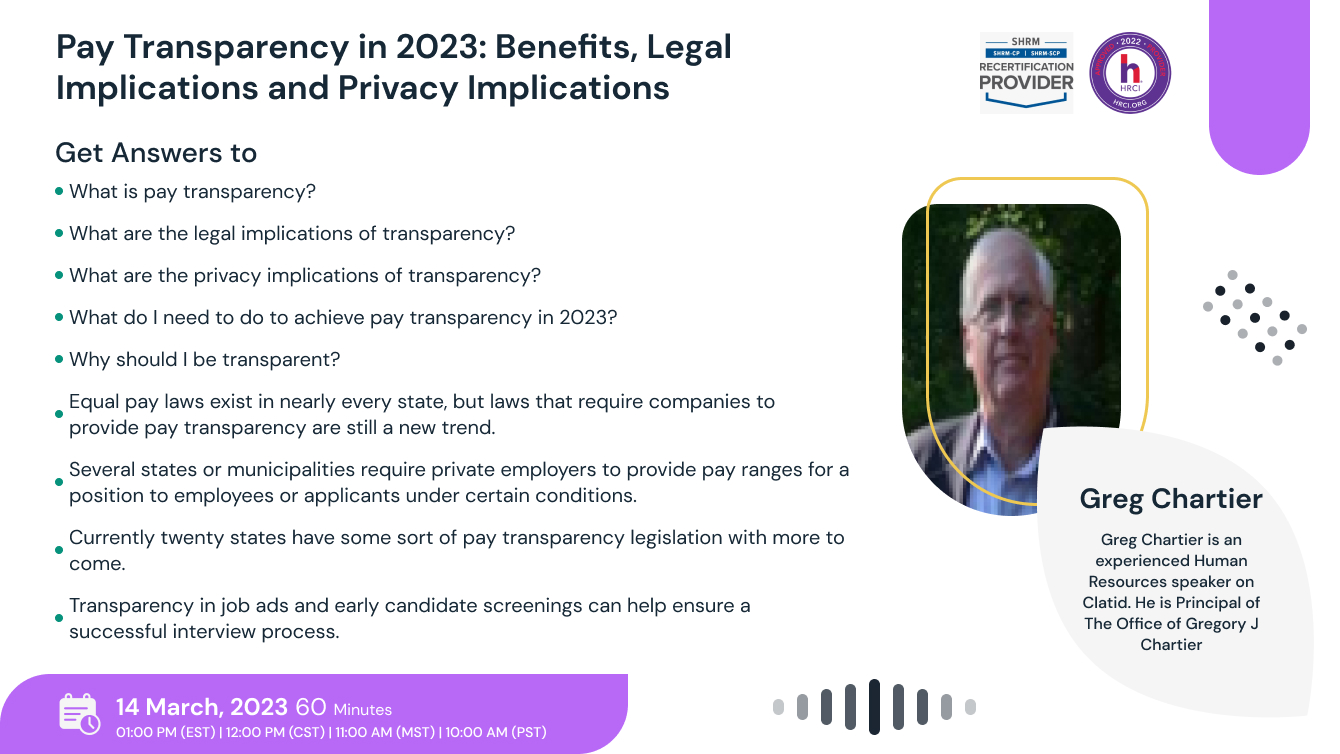Pay Transparency in 2023: Laws, Benefits and Implications
It is becoming more clear; employees want clarity and transparency about their pay and their pay equity. Fully two-thirds of surveyed employees say they want pay transparency while only twenty-five percent of employees say that they know and understand their pay.
Today's workforce is more mobile than ever, and employers must work harder to retain and develop loyal team members. A strong focus on pay transparency can give employers the edge they need to attract and retain talent.
Many employees are focused on pay gaps and pay transparency more than ever before. To remain competitive in today's hiring landscape, employers may choose to foster open dialogue around the topic of pay transparency and help employees understand how the company’s compensation plans apply to them.
Pay transparency is the practice of openly and proactively sharing information on organizational compensation practices, including pay rates for specific positions, pay increases, bonuses or commission structures, benefits, retirement plans, or any other specifics about pay. This information may be shared voluntarily on a company's website, in job listings, or upon request, although pay transparency may be required under certain circumstances in specific jurisdictions.
Join us this March to learn about the latest updates, laws, benefits and implications regarding pay transparency in 2023.
Get Answers to
-What is pay transparency?
-What are the legal implications of transparency?
-What are the privacy implications of transparency?
-What do I need to do to achieve pay transparency in 2023?
-Why should I be transparent?
TA
-Equal pay laws exist in nearly every state, but laws that require companies to provide pay transparency are still a new trend.
-Several states or municipalities require private employers to provide pay ranges for a position to employees or applicants under certain conditions.
-Currently twenty states have some sort of pay transparency legislation with more to come.
-Transparency in job ads and early candidate screenings can help ensure a successful interview process.
Session Highlights
-Defining pay transparency for your organization
-The steps to go through to achieve pay transparency
-How to deal with managerial resistance
-Dealing with privacy issues
-How to get started
-Pay transparency laws
Why You Should Attend
Being transparent about how your company pays employees can help you in more ways than complying with applicable state and federal laws. Once your transparency plan is in place, it can aid in your recruiting and retention efforts, help your HR team avoid surprises concerning pay, and improve your company culture. The efforts required to develop additional pay transparency can ultimately lead to operational efficiencies that keep your employees happier and help improve your bottom line.
Who Will Benefit
-Human Resource professionals
-Finance professionals
-Recruiting team
-Staffing professionals
-Budgeting professionals
-Employee Relations professionals

Greg Chartier
Greg Chartier is an experienced Human Resources speaker on Clatid. He is Principal of The Office of Gregory J Chartier, and is a well-known management consultant, educator and speaker and author of the recently published What Law Did You Break Today? His practice is based on the Business Partner Model of Human Resources, which emphasizes on outsourcing, the use of technology to gain efficiencies and the improvement of managerial skills.
Greg is a thought-provoking professional speaker and his wisdom and insights into management and leadership make him an electrifying speaker and seminar leader. His seminars are customized to reinforce company mission, vision, values and culture and the content is practical for team leaders, managers, supervisors and executives. His philosophy is simple: management is a skill and you can be a better manager by developing your skills.
He has a bachelor's Degree from The Citadel, the Military College of South Carolina, an MBA from Rensselaer Polytechnic Institute and his Ph.D. in Human Resources Management from Madison University. Greg is certified by the Society for Human Resources Management (SHRM) as a Senior Professional in Human Resources (SCP) and as both a Senior Professional and a Global Professional in Human Resources (SPHR and GPHR) by HRCI, the Human Resource Certification Institute.
He is a former Board Member of the Business Council of Westchester, where he was the Chair of the Human Resources Council and a member of the Executive Committee. Greg is a national member of SHRM and a local SHRM chapter, the Westchester Human Resources Management Association. He was also a member of the Board of the Child Care Council of Westchester.
Greg is involved in the Certification Program for Human Resources Management at Pace University, which includes the preparatory program for the Human Resources Professional Examinations and the Essentials in Human Resources Management Program, as well as the Continuing Education Programs including HRCI and SHRM recertification. He is also a member of the faculty of the New York Medical College in Valhalla, NY.
Standeagle Webinar Certification - Standeagle rewards you with Standeagle Achievement Certification for unlocking and attending this webinar. It is to acknowledge your participation in this training session and to add more to your professional score.
Standeagle Courses and Webinars or any Education published "Articles & Materials" strictly follows the standards and guidelines of the Professional Credit / CEU Providers and Well Researched before publishment.
Standeagle doesn't support any Fake - News, Articles, or Compliance updates; Our Industry Experts are highly verified and recognized, and their Pre-publishment is verified via our experts and fact-checkers.

ACCREDITATIONS


